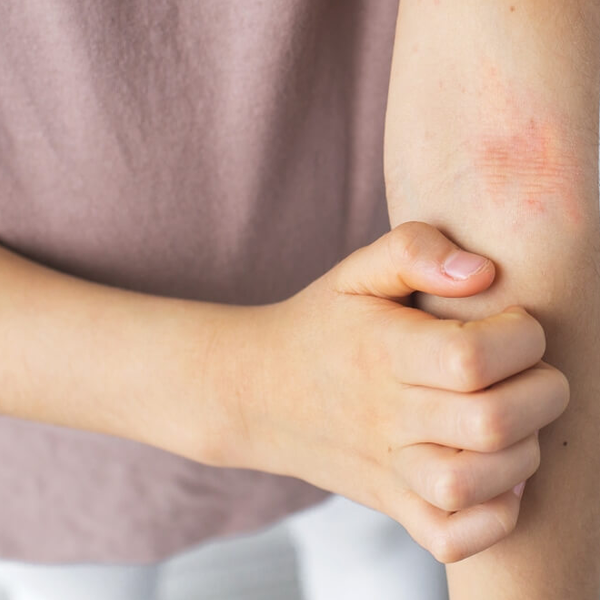Pediatric Atopic Dermatitis Clinical Trials
Living with atopic dermatitis can be challenging, but innovative research is shaping the future of care. 3A Research is conducting Atopic Dermatitis Clinical Trials to evaluate new investigational treatments. See if you qualify and take part in a study that could improve future treatment options.
Application for Current Clinical Research Study

Atopic Dermatitis Clinical Trials
Understanding the Condition
Atopic dermatitis (AD) is a chronic inflammatory skin condition that causes redness, itching, and irritation. It affects millions, including children and adults, and can significantly impact daily life. Through Pediatric Atopic Dermatitis Clinical Trials, researchers explore innovative ways to manage symptoms and improve treatment options.
If you or your child suffer from AD, participating in a study can provide access to investigational treatments of atopic dermatitis while contributing to medical advancements. Our pediatric atopic dermatitis clinical trials in El Paso, TX focus on young patients, while other studies include adults.
By joining an Atopic Dermatitis Research Study in Texas, you play a vital role in discovering new therapies. Explore how clinical trials contribute to the future of eczema clinical research studies in Texas and help improve treatment outcomes for others.
Important Information About Participation
Participation in Pediatric Atopic Dermatitis Clinical Trials is voluntary. Investigational treatments are evaluated for safety and effectiveness, but there is no guarantee of personal benefit. Studies are conducted under strict regulatory guidelines. Consult with your healthcare provider before enrolling in an eczema clinical research study in Texas or any other trial.

Age
2 Years to 11 Years

Gender
Girls and Boys

Condition
Atopic Dermatitis in Children

Location
Texas

About Atopic Dermatitis Study
Atopic dermatitis (AD) is a skin condition that causes itching, redness, and inflammation. Many treatments are applied directly to the skin, but some patients need stronger medication that works throughout the body. This study compares an investigational drug to an approved treatment in children with moderate to severe AD who need systemic therapy.
The study will check how well each treatment works and monitor any side effects. Children aged 2 to under 12 years may qualify. Researchers will assign participants to either the investigational drug or the approved treatment based on specific factors like age, disease severity, and previous treatments.
Participants will visit the study site regularly for check-ups, medical tests, and to track progress. The study aims to provide valuable insights into pediatric AD treatment.
By joining, participants will receive study-related care at no cost and help advance new treatment options for children with AD. If you think your child may qualify, contact us today!
Enroll Now
[contact-form-7 id=”366ebe8″ title=”Contact form 1″]
What to Expect in Atopic Dermatitis
Clinical Trials
Clinical trials provide participants with access to investigational treatments of atopic dermatitis under expert medical supervision. You may undergo evaluations, receive study-related care, and help shape the future of atopic dermatitis research study in Texas. Each study has specific eligibility criteria—contact us to learn more.
Frequently Asked Questions
How do you treat atopic dermatitis in children?
Treatment for atopic dermatitis in children focuses on reducing inflammation, relieving itching, and preventing flare-ups. This may include moisturizing regularly, using mild soaps, avoiding triggers, and applying topical steroids or calcineurin inhibitors prescribed by a doctor. In some cases, antihistamines, wet wrap therapy, or biologic medications may be recommended.
What is the best treatment for atopic dermatitis?
There is no single “best” treatment, as it depends on the severity of the condition and individual triggers. However, a combination of daily skin care, trigger avoidance, and prescribed medications—such as corticosteroids, topical calcineurin inhibitors, or biologic treatments—can help manage symptoms effectively.
What is the prognosis for a child with atopic dermatitis?
Many children outgrow atopic dermatitis or experience milder symptoms as they get older. However, some may continue to have flare-ups into adulthood. Early and consistent treatment can help manage the condition, reduce discomfort, and prevent complications like infections or long-term skin damage.
What happens if atopic dermatitis is not treated?
If left untreated, atopic dermatitis can lead to persistent itching, skin thickening, and an increased risk of skin infections due to scratching. Chronic inflammation may also contribute to allergies or asthma in some children. Proper management can help prevent these complications.
What is the major symptom of atopic dermatitis in children?
The most common symptom is intense itching (pruritus), often accompanied by dry, red, scaly, or cracked skin. In infants, the rash typically appears on the face and scalp, while older children often develop patches in skin folds, such as behind the knees or inside the elbows.
